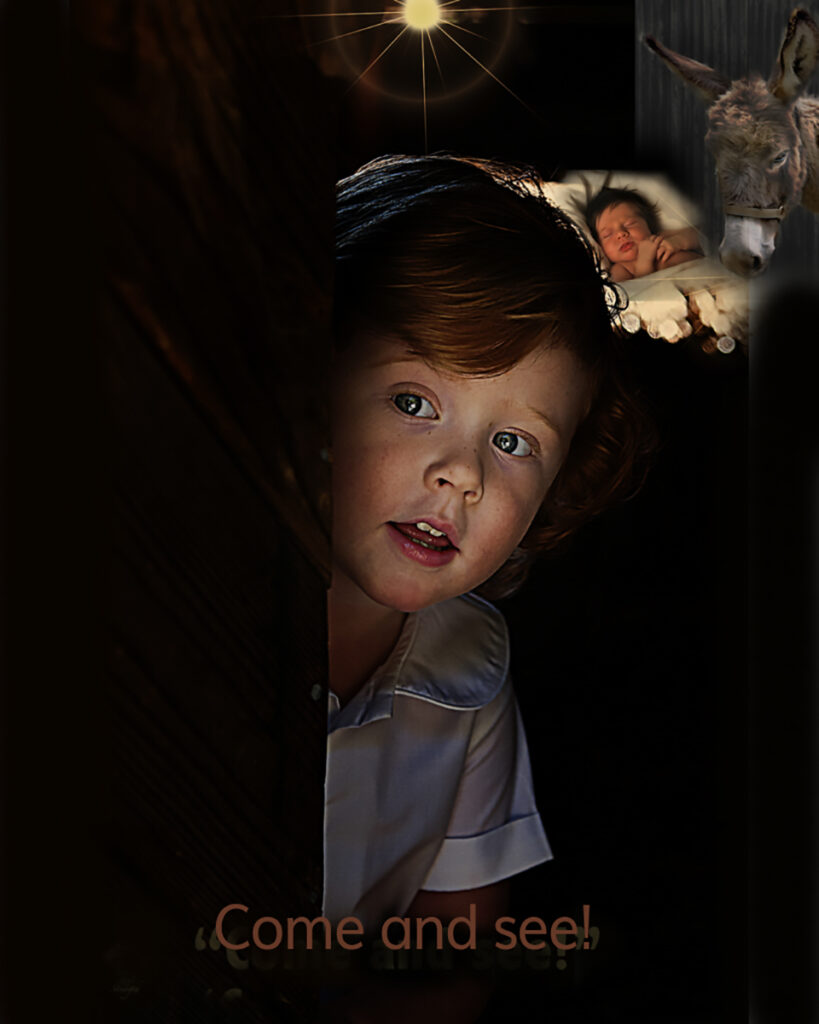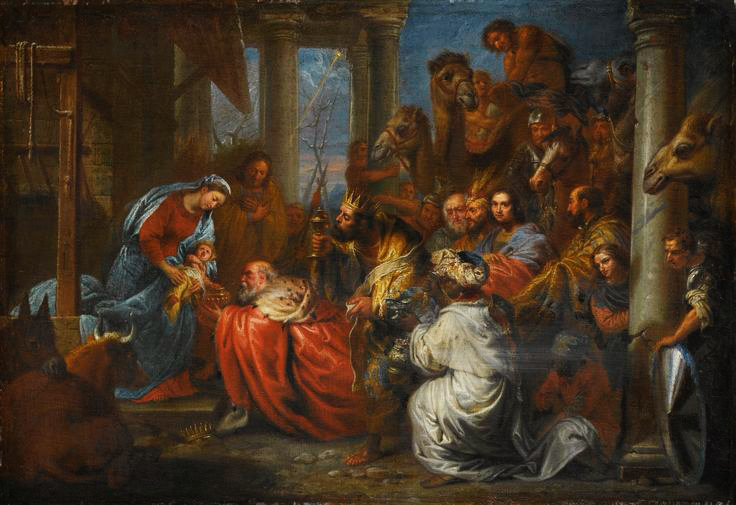
I always wondered how the shepherds found Mary and Joseph and the Baby out of all the animal sheds in Bethlehem since many people kept animals. Here is my idea: What if there was only one hostel, inn, or guest house in Bethlehem? It was a small town, after all, with about 300-600 people according to best calculations. (That means possibly only a hundred houses in town.) The angel’s clue was to look for him in a feeding trough. If the baby was in a feeding trough, then the Baby was in a shelter for animals. If the Baby and his parents were in an animal shed, they didn’t live in Bethlehem or they would have had their own place, so they must be visitors. If they were visitors, then they should be at the inn. No need to wake everyone up in the inn if the Baby was in the animal’s trough. Just go to the stable attached to the back of the inn (or on the lower floor of the inn.) Another theory some scholars hold is that Mary and Joseph found shelter in the bottom level of a watchtower where ewes were housed during sacrificial lambing season. Whatever the case, no one gave up their own comfort to give Mary a safe place to give birth, so the lamb of God was born in an animal stall in extremely humble conditions where he was accessible to the searching laborers who smelled of sheep.

The innkeeper is often maligned because he callously assigned the mother-to-be to the stable. (Or he directed them to the tower.) The owner of the guesthouse didn’t refuse to welcome them. He just gave them what was left. After all, he had no idea who the Fetus would grow up to be. We have the benefit of hindsight, yet I wonder if we ever treat Jesus the same way. We have the record of all that Jesus said and did. The miracles, the teachings, his sacrificial death for us, and finally the proof of his deity in the resurrection. In spite of all we know, I wonder if we’re guilty of giving him the leftovers. On a daily basis, do we offer him the best we have or just what’s left over after we do our thing? Do we give him room in our schedules? Is he considered first when we plan our days and make our decisions? Or do we treat our time with and for him as an afterthought? Is it inconvenient to invite him into our lives because we’re used to having our own way? Do we take time to include him even when we’re busy and overworked? Is he welcomed into our private lives; our thoughts and dreams?
Let’s get practical. How exactly do we make room for Jesus in our day-to-day lives? (These are abridged suggestions. There are so many other ways!)

The Gathering Together principle:
In the Old Testament, God required gatherings for three feasts or festivals at the Temple in Jerusalem each year. The worshipers were to bring a sacrifice that sustained those who served in the Temple and which also provided a festive meal for the worshiper and his family. This was a time to remember what God had done, participate in a sacred ceremony, praise God with music, and enjoy the company of others. God knew this was good for his people. During the rest of the year, they gathered in local groups to read the Scripture and hear teaching on the Sabbath.
In the New Testament, believers in Jesus gathered locally on the first day of the week for teaching, worship, and fellowship. They also celebrated a ‘feast’ commemorating the Last Supper. Music remained part of their worship experience.
Every time we gather with like-minded believers, we are inviting Jesus to join us in a special way. (He’s always with us but he is present in a special way when we gather in his name.) Setting aside a part of our week for this important activity is one way we make room for Jesus in our lives.
The Giving Principle:
In the Old Testament God made provision for the needy by commanding his people to leave part of their harvest for the poor. They were to leave the borders of their fields unharvested so those who needed food could come and take it. They were to only go over their fields to cut the grain once. Anything dropped or missed was allowed to be gleaned by those less fortunate. Giving to the poor was modeled by Job, Boaz, and the Proverbs 31 wife, among others. Each family was commanded to give at least one-tenth of their profits to God by presenting it at the Temple. Part of the people’s gifts to God was set aside for the sustenance of the priests who served God.
In the New Testament, we see a big emphasis on providing for those who didn’t have enough. The churches helped widows who didn’t have family members to provide for them. Whole groups of churches prepared a collection for other churches located in areas of famine. And, yes, churches paid those who taught them the Scriptures. This extended to supporting men who traveled to new areas and taught those who hadn’t yet heard of Jesus.
Being generous to our church and to those in need is another way we make room for Jesus in our lives.
The Meditation Principle:
In the Old Testament, all the greats of the faith like Abraham, David, and Job lived with an awareness of God. They knew God was watching and was involved in their daily lives. They counted on his presence and his promises and they talked to and about him.
In the New Testament, Jesus modeled Scripture meditation, private and group prayer, spiritual conversations both in public and in private, and singing a hymn on the most momentous night of his earthly life. We know each moment of his life was lived in awareness of and obedience to his Heavenly Father.
We are in charge of our thoughts. Thoughts express themselves in what we say, what we do, and who we become. We have the help of the Holy Spirit to control our thoughts. He helps us to direct our thoughts to the good, the positive, and the pure. Thinking about a Scripture verse or principle keeps our outlook positive and warns us away from danger. Prayer should be our first recourse whether we’re happy or stressed. Calling out to God for help or thanking him for blessings should be a way of life. It can be as simple as giving thanks before we eat or whispering a ‘Thank you.’ while mesmerized by a colorful sunset. Then, of course, our inner thoughts will spill out of our mouths sooner or later. Some folks will relish a conversation about God and others will turn away. Music about and for God nourishes our souls reaching deep into our emotions and turning us heavenward.
We make room for Jesus by gathering together for teaching, worship, and fellowship, by giving generously to those in need and to our churches, and by meditating on Scripture, praying, having spiritually significant conversations, and enjoying worshipful music.
In all these ways we make room for Jesus. Merry Christmas! I don’t know the name of the artist of the painting of the Magi above.
I don’t know the name of the artist of the painting of the Magi above.